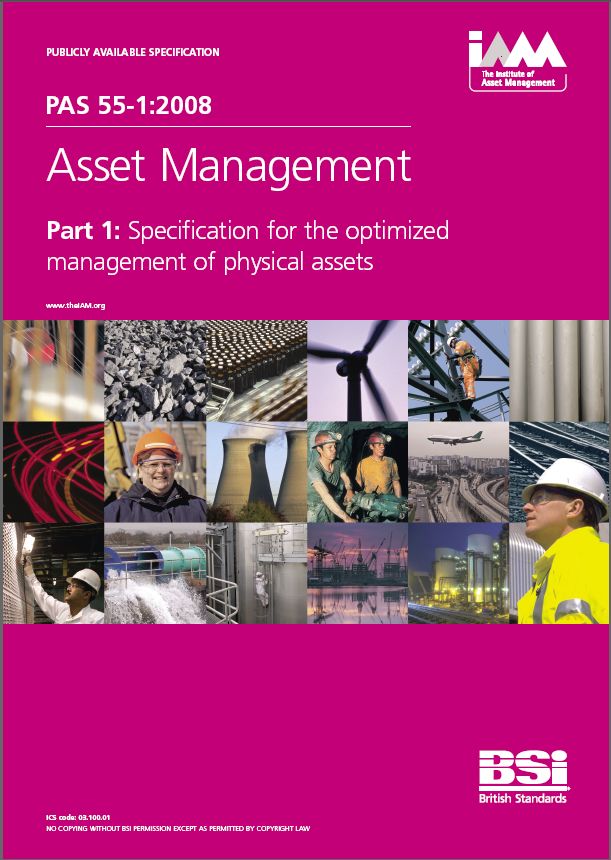BSI PAS 55
Overview
BSI PAS 55:2008 is the British Standards Institution’s Publicly Available Specification for the optimised management of physical assets. PAS 55 was initiated by the IAM, and is an internationally recognised specification defining what good asset management means and the hallmark for demonstrating competent governance of critical infrastructure.
PAS 55 provides detailed guidance and examples of good practice in all facets of acquiring, owning and ultimately disposing of physical assets. A 28-point checklist is included for good practices in life cycle planning, cost/risk optimisation and joined-up thinking, and an extensive glossary of key terms. The specification defines the integrated approach required to meet conflicting stakeholder demands, achieve best value for money, and deliver significant performance improvements. It enables the integration of all aspects of the asset life cycle: from the first recognition of a need to design, acquisition, construction, commissioning, utilisation or operation, maintenance, renewal, modification and/or ultimate disposal.
PAS 55 is applicable to all sectors and all asset types and is in widespread use by many enthusiastic users. The specification is utilised within public services and property, utilities, transport, manufacturing, mining, oil and gas, defence, pharmaceutical, process and heavy engineering industries.
Using PAS 55
PAS 55 supports third party and self-assessment to assure customers, owners, employees, regulators and other stakeholders that the business is in good hands. Using PAS 55 brings the following benefits to an organisation:
- Enhanced customer satisfaction from improved performance and control of service delivery
- The ability to achieve and demonstrate best value for money
- Improved risk management and corporate governance, with a clear audit trail
- Optimised return on investment and/or growth
- Improved health, safety and environmental performance
- Confidence from long-term planning, better sustainability and performance
- Improved corporate reputation, including enhanced shareholder value, greater staff satisfaction and more efficient procurement and supply chain
Certification against PAS 55 became a regulatory requirement in a number of industries. Compliance provides evidence of systematic, cross-disciplinary and optimised management that correctly blends responses to short-term requirements with the sustainable delivery of long-term goals.
The PAS 55 specification includes definition of asset management terms, requirements specification for good practice and guidance for the implementation of such good practice, and provides a common language between asset managers and finance. It defines the integrated approach required to meet conflicting stakeholder demands, achieve best value for money and deliver significant performance improvements. It can be used for:
- aligning knowledge
- self-assessment
- benchmarking
- improvements planning
- independent audit
- certification
- contractor selection
- demonstration of competence
There are two parts to BSI PAS 55:2008 PAS 55 - Part 1 presents the checklist of what needs to be in place and Part 2 provides extensive guidance and illustrations of how to achieve the requirements of Part 1.
Background
BSI PAS 55 was in development for more than 6 years. Over 50 public and private organisations spanning 10 countries and 15 sectors contributed to the specification, along with user feedback. First issued in 2004, it has been updated by an international organisation panel covering many different sectors.
The IAM and BSI are proud that, since its publication in 2008, PAS 55 has become the default global standard for asset management. After the launch of PAS 55, the IAM worked with the BSI to produce a formal International Standard through the International Organisation for Standardization (ISO) - ISO 55000. The three international standards (ISO 55000, 55001 and 55002) are important because they represent a global consensus on asset management and what it can do to increase value generated by all organisations.

